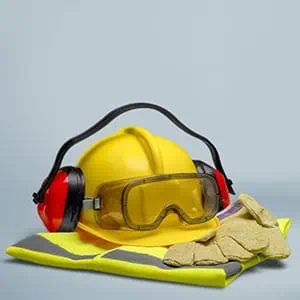Is your protective gear actually keeping you safe? As a blue collar worker, you’re exposed to unique hazards. Using the right personal protective equipment (PPE) isn’t just about compliance; it’s essential for keeping staff injury-free. Let’s dive deeper into what gear you absolutely need, why it’s crucial, and how you can ensure it meets safety standards.
What Does OSHA Say About PPE?
OSHA emphasizes that employers must PPE whenever hazards can’t be completely removed through other controls, such as engineering or administrative solutions. Simply put, your boss is legally obligated to supply the necessary gear that safeguards you from injuries and occupational illnesses.
If your employer tries to save costs by offering inferior gear or neglecting proper training, they’re not only violating OSHA regulations but putting your health and safety at significant risk.
PPE Duties For Florida Warehouse Supervisors
Warehouses present specific safety challenges working with hot temperatures, slippery surfaces, heavy machinery, and moving or falling objects. Employers operating warehouses in Florida must supply specialized PPE tailored to these conditions, including:
- High-Visibility Vests: Essential for being clearly visible around moving vehicles and machinery.
- Slip-Resistant Footwear: Crucial on slick, often wet floors, particularly during Florida’s humid rainy seasons.
- Protective Gloves: Necessary to prevent injuries like cuts, abrasions, chemical burns, and heat-related issues.
- Eye Protection: Vital for safeguarding eyes against flying debris, chemical splashes, dust, or harmful particles.
- Cooling Apparel: Important to help prevent heat stress, heat exhaustion, or heatstroke during the intense summer months.
Essential PPE Required To Work In A Florida Factory
Factory environments pose even greater risks due to exposure to heavy equipment, harmful chemicals, loud noises, and extreme temperatures. Essential factory PPE includes:
- Hard Hats: Mandatory protection against impacts from falling or flying objects.
- Ear Protection: Factories generate significant noise, making hearing protection crucial to avoid permanent hearing loss or tinnitus.
- Respiratory Protection: Essential when working with airborne contaminants, chemicals, dust particles, or toxic fumes.
- Heat-Resistant Clothing: Florida’s intense heat combined with factory machinery significantly increases the risk of burns, making protective clothing critical.
- Safety Harnesses: Required for workers involved in tasks at height, preventing potentially fatal falls.
Typical Injuries Caused By Lack Of Protective Equipment
Bad protective gear isn’t just uncomfortable, it’s downright dangerous. Common severe injuries from inadequate PPE include:
- Head Trauma: Occurs frequently when helmets are absent or defective.
- Chemical Burns And Respiratory Diseases: Arise from lack of or inappropriate respiratory protection.
- Eye Injuries: Often caused by disregarding the use of protective eyewear.
- Hearing Impairment: Results from prolonged exposure to workplace noise without adequate ear protection.
- Heat-Related Conditions: Florida’s hot climate can rapidly cause heat exhaustion, heat stroke, or severe dehydration when proper cooling apparel is absent.
- Fall Injuries: Often severe and life-threatening, frequently caused by inadequate or missing fall protection gear.
Such injuries can have a devastating long-term impact on your career, physical health, and overall quality of life.
How To Tell If You’re Using The Right PPE
Good PPE isn’t just meant for the people operating the crane; it’s an essential safety requirement for all workers present on the ground. Here are some guidelines to help you test the “protectiveness” of your PPE:
- Condition Check: Inspect your PPE regularly for visible damage like cracks, tears, holes, or worn-out areas. Immediately replace any compromised gear.
- Proper Fit: PPE should fit snugly without restricting movement. Equipment that’s too loose or tight might compromise your safety or effectiveness.
- Certification Marks: Always verify your gear for standard compliance symbols, such as ANSI or OSHA certification marks, confirming they meet regulatory safety criteria.
- Comfort And usability: PPE should not significantly interfere with your job tasks. Uncomfortable gear might indicate incorrect usage or the wrong type of equipment for the task.
- Feedback: If you notice recurring issues or discomfort, communicate promptly with your supervisor or safety officer to find appropriate alternatives.
References:
